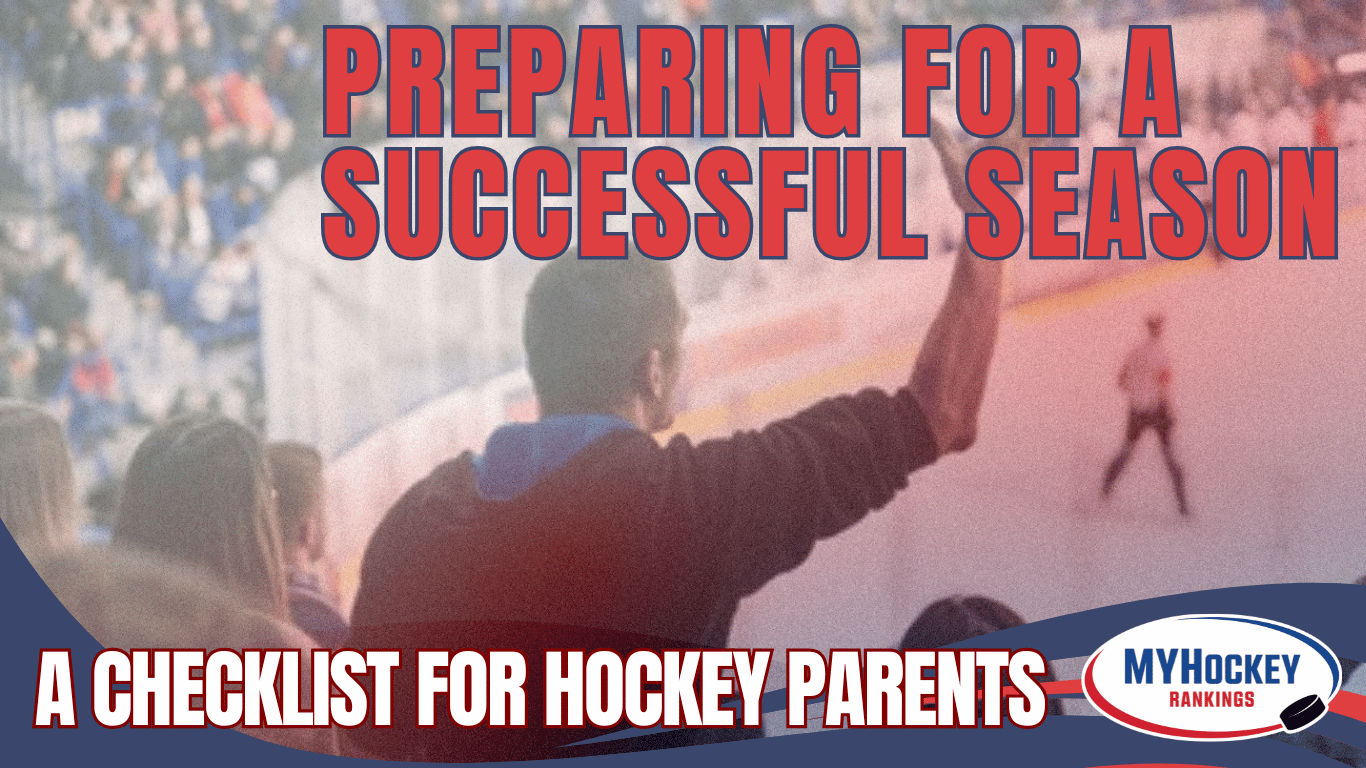
Preparing for a Successful Season: A Checklist for Hockey Parents
By Scott Lowe – MYHockeyRankings.com
We’ve posted a series of articles this summer in hopes of helping youth hockey players and families maximize the chances that their 2025-26 hockey season is successful. Now, with the first huge weekend of the new campaign in the rearview mirror, here is some final advice for parents to help them navigate the season and to refer to throughout the year.
There still is, as they say, a lot of game left, and these are just some simple ways that parents and other family members can contribute to the success of a young player’s hockey season.
Before we go further, though, it’s important to revisit exactly what makes a youth hockey season successful for an individual player. We’re not talking about wins and losses or championships or even the team having a winning record. And we’re not talking about goals, assists or points.
Certainly, playing for a team that wins more than it loses tends to be more fun than for a team that isn’t as successful, but a championship season doesn’t mean the year was successful for each individual player on the team. And while scoring a bunch of points is fun for young players, that alone does not ensure a successful season either.
Many kids end up playing on the best team they can for the prestige, the challenge or in hopes of winning championships when maybe they’d be better served playing for a team that isn’t quite as strong or that plays at a lower level. Sometimes this is driven by parents and egos and is an attempt to keep up with what friends or the kids of folks in their social circles are doing.
That is not a recipe for a successful season for any young player.
Hockey gets serious enough fast enough. It’s important to consider whether a player’s experience will be enhanced enough by playing a minor role on a highly ranked team that wins a lot to make it worth giving up what may be a better developmental opportunity that is more enjoyable playing for a team that is not as strong.
Is it fun for a young player be on a team that wins a bunch of games and championships while spending most third periods of close contests watching from the bench?
Is being challenged by practicing and working hard to keep up with higher-level players while rarely or never getting used in different key game situations helping a player develop as much as playing farther up in the lineup and being exposed to power-play, penalty-kill and critical end-of-game opportunities?
It takes a special person to come to practice every single day, work as hard as everyone else and never really get rewarded for that hard work. At some point, as players get older and decide they want to pursue hockey seriously to the highest level they can achieve, they will hit their ceiling and need to decide on their own if the juice is worth the squeeze. By then – we are talking about junior, college or maybe even higher-level prep or high school hockey – they should be old enough and mature enough to determine if they want to put in the time, energy and work just to earn a spot on a team regardless of the role they will play.
If it’s a school team – for self-esteem or perceived social acceptance – they may decide that the sacrifices are worth it. And if they view an opportunity as a means to an end – perhaps they believe they need to play on a certain team or at a particular level to continue advancing toward achieving their long-term hockey goals – they also might choose to do whatever it takes without complaint or regret.
Once they are emotionally mature enough, those are decisions they can make on their own and accept whatever consequences result from those choices. Every young person matures at different rates emotionally and physically, however, so it is up to parents who know their kids best to monitor their growth and determine when they are ready to tackle important life decisions on their own.
That isn’t always easy, but as adults it’s important to remove biases, egos and emotions from the situation until kids reach that point. Before that, parents are charged with providing the guidance their kids need to make decisions that place them in the best possible position to develop as athletes and people. The goal should be to do everything possible to ensure a child’s athletic experience is successful.
Of course. it’s natural for parents to want their kids to be the best they can be, to play on the best teams they can make, to enjoy the experience as much as possible and to improve. When emotions and egos factor into the equation, though, adults can lose sight of what really is fun for their kids and what is best for their athletic and emotional development. To satisfy personal needs or desires – or because of FOMO (fear or missing out) and a desire to keep up with others – even adults can make decisions for the wrong reasons. And that can lead to a poor or unsuccessful experience for their kids.
No parent wants that to happen, but unfortunately it occurs frequently and may lead to long-term burnout among young athletes and may even cause them to dislike a sport tthey previously loved. But as long as parents understand what makes a season successful for a young athlete and try their best to help kids make decisions based on that understanding, everything should work out for the best.
It's also important for parents to understand that no one is perfect, and we all make mistakes. Decisions made with the best intentions don’t always work out as planned, so when a situation doesn’t pan out, it always helps if parents remain positive and try to help their kids make the best of it.
When that happens, frustration is inevitable, and it can be hard for parents to not pass along those feelings and some negativity. Everyone needs to vent and talk about their feelings, but there are other adults in people’s lives with whom those thoughts can be shared. When speaking to or in front of a child in hopes of salvaging the situation and turning a potential negative experience into a positive, it’s important to focus on the silver lining whenever possible.
For parents who want to do whatever they can to ensure that their children have a successful season, it’s essential to understand exactly how that is defined.
What Makes a Season Successful?
From the perspective of someone who has coached at various levels for almost 30 years, parented two kids who have gone on to become successful collegiate student-athletes and worked professionally in high-level athletics most of his adult like, what defines whether a young athlete’s season is successful is simple.
A season can be considered successful if:
- There was a noticeable improvement in the athlete’s skill level.
- The athlete’s confidence and overall impact on games increased.
- A player-coach relationship was built in which the athlete was comfortable asking for coach feedback, could communicate freely with the coach and wasn’t intimidated by the coach.
- The athlete developed a clear understanding of his or her role on the team as well as the impact that fulfilling that role had on the team’s success.
- It was fun.
Improved Skill & Confidence
Parents have watched their children develop over time and usually attend many or most games and practices, so it’s usually easy to see if a kid has improved during a season. Increased confidence and impact on games goes hand and hand with skill development and improvement, so that also shouldn’t be hard to determine.
The Player & Coach Dynamic
Sports participation should be comfortable and non-threatening for young athletes, so when helping a child choose a team it’s imperative that parents look for a coach whose style and demeanor mesh with their child’s personality and emotional maturity level.
When my daughter began trying out for club lacrosse teams, at the first tryout she went to the person who ran the club was on the field yelling at the kids for every bad pass and mental mistake. Then he hugged them all after the tryout, almost as if he felt bad for his actions. That program is one of the most successful in our area.
She attended another tryout that was much less intense and during which the players were allowed to play more freely. Many parents in Maryland, where we live, take their kids to lacrosse tryouts as they approach middle-school age already thinking about the best path for them to earn a college athletic scholarship. Those parents may be looking for a coach who will push and challenge their kids and essentially force them to improve, so the club with the director who was aggressively demanding perfection likely is attractive to them.
As parents, we couldn’t imagine any fifth-grade kid being comfortable in that type of atmosphere, and my daughter wanted no parts of it. She chose the other club, which had an equally strong reputation, and we had absolutely no issue with that.
While some parents might make their decision about a team or coach based on their own long-term goals for their kids, finding a situation where the young athlete is comfortable and able to build a relationship with the coach is so much more important to his or her overall long-term development. Athletic scholarships are much harder to earn than most parents realize, so what if that opportunity never materializes and a kid’s first experience with a higher-level coach is intimidating and uncomfortable?
Learning to be comfortable and communicate with adults and the authority figures in their lives is an incredibly important life skill that sets kids up for future success on the field, in the classroom and beyond – even when the athletic scholarship doesn’t pan out.
Every Player Has a Role
While every hockey coach would love to have 12 highly skilled forwards who play hard all 200 feet, don’t mind being physical or getting hit, will compete and battle for every loose puck and sell out to block every shot, coaches have figured out that finding players who are able – and willing – to do all of those things is next to impossible. Thus, a lineup needs to be assembled that includes a group of players who in combination bring those elements to the ice whenever a team plays.
For a hockey team to be successful it needs skilled players who can score goals and create scoring opportunities for teammates, fast players who can stretch the defense, physical players who can win battles and get the puck to the scorers, fearless players who will take on any opponent and block shots, defensive-minded players who take pride in shutting down the opposing team and skate well enough to keep up with their opponents backwards and forwards and players who simply love to compete and never get outworked in practices or games.
Some players simply don’t have the instincts and never will develop the skill level to score a lot of points, but many of those who do produce offensively may not be built physically to fill the other roles required for a team to be successful. And frankly, some of the most-skilled players may not be willing to do those things – and the coach may not want them to for fear of risking injury.
Players who are willing and able to fill each of those roles are needed for a team to be successful. Some players never score a lot of points, but they excel at other important aspects of the game and advance to play at the sport’s highest levels. One of the coolest aspects of hockey is that the role players, or “glue guys” as they are called, often are what separate championship teams from the others and tend to be appreciated more than they are in other sports.
Of course, scoring goals is fun and the players who produce a lot of points tend to get more outside attention than the others. That makes the player-coach relationship even more important, because if a young player is comfortable and able to build a relationship with the coach, it’s easier to develop an understanding of exactly what the player’s role is and how important fulfilling that role is to the team’s success.
This understanding also can help parents tailor conversations with their kids about hockey. It allows them to reinforce the role the coach has defined as well as how important it is for the player to take pride in that assignment because it contributes to the team’s success. Those conversations are much more productive and likely to help a player enjoy the season than constantly questioning the coach or wondering out loud why some kids play higher in the lineup or get more power-play time.
When my son first started playing hockey, he was middle-of-the pack on his team in terms of skill, but he always loved to play and compete and had a high innate hockey IQ. He often played near the top of the lineup, but I clearly remember a game when the coach pulled him aside and explained that the team needed him to play on a line with some of the weaker players and for them to focus only on not letting the other team score when they were on the ice.
My son came and told me that before the game and seemed really motivated that the coach had trusted him with that responsibility, so I simply tried to reinforce the message and tell him how great it was that the coach would single him out for that job. He went out and competed like I had never seen to that point in his life, and his line even scored a couple goals.
It would take way too many words to explain all the lessons this might have taught to a kid who would go on to play 102 NCAA hockey games over five seasons, but it’s a great example of how messaging, communication between a player and coach and parental reinforcement can help shape a player’s experience.
Was it Fun?
For young athletes, sports participation must be fun. Period. Otherwise, what’s the point?
If kids don’t enjoy participating, there’s no sense in forcing it. For parents with kids who are still young enough that most of their decisions and activities are based on opportunities and guidance they provide, the goal should be to open doors for them and let them develop their own likes and dislikes.
It should make us happy to see them happy whether they are playing the sport we played, competing in a different sport or participating in some other non-athletic activity for which they develop a passion. If they fall in love with whatever they pursue, there is no telling how far it might take them. At the very least. it will provide them with a lifetime activity they always will enjoy.
Perhaps the best indicator of a successful season is if the player had fun. If it’s never a struggle to get a child to practice on time; if he or she at least occasionally asks to go to the rink to skate or for an extra skills or stick-and-puck session; if the player goes outside now and then and shoots pucks or practices stickhandling; if the child asks to spend time away from the rink with teammates and never seems to dwell on losses or mistakes, it’s a safe bet that the season was fun.
And that is what’s most important.
A Hockey Parent’s Checklist
Here is a quick checklist for parents who want to help ensure that their kids have a successful hockey season:
- Set a good example for the player; always make sure to get to the rink on time or early without having to rush. Emphasize the importance of following team rules and respecting the coach.
- Let the player initiate or carry conversations about games and the team instead of asking leading questions that can spur discussions about the coach, playing time or teammates. Try something like, “Wow, that was a fun game (or maybe a tough game if it’s a loss). What did you think?”
- Don’t dwell on wins and losses; instead, focus on and praise effort, energy and compete level and how important it is to always play hard no matter the score or circumstances.
- Reinforce coach messaging instead of questioning the coach.
- Praise little things that might go unnoticed such as backchecking, battling for loose pucks, passing and blocking shots instead of emphasizing goals or points.
- Find the silver lining even in the most difficult or bleak situations; try not to get overly excited about the wins or show extreme disappointment about the losses.
- Point out positive examples in areas of a player’s game that have improved or evidence that the player is playing with more confidence or showing leadership qualities.
- Live in the moment, but don’t dwell on it; the game was great, win or lose, if the team played hard, listened to the coach, never gave up and showed good sportsmanship. No loss or mistake is the end of the world.
- Always end the conversation by saying how enjoyable it is to watch the child play and make sure that he or she had fun. Reinforce that with, “Great! That’s what matters most.”

